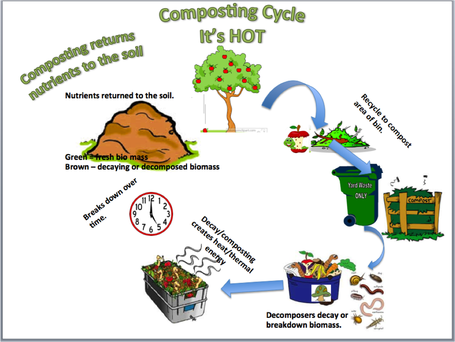Composting Cycle
Returning nutrients to the soil and Gases to the Atmosphere
Composting and Decomposition of Matter
Decay of biomass (bio-living, mass-how much)
Everything that lives, is returned to soil when it dies. Composting is the breaking down or decay of biomass to return the nutrients to the soil so that new things can grow.
• When an organism dies, it decays. This is the natural decomposition or rotting that occurs when the tissues, including carbon, are broken down by decomposers, such as bacteria or fungi, releasing CO2.
• Burning wood or fossil fuels (oil, gas) releases large amounts of CO2 into the atmosphere since they are derived from plants, they contain carbon, which is released as CO2. Examples: car emissions, factories, forest fires
Everything that lives, is returned to soil when it dies. Composting is the breaking down or decay of biomass to return the nutrients to the soil so that new things can grow.
• When an organism dies, it decays. This is the natural decomposition or rotting that occurs when the tissues, including carbon, are broken down by decomposers, such as bacteria or fungi, releasing CO2.
• Burning wood or fossil fuels (oil, gas) releases large amounts of CO2 into the atmosphere since they are derived from plants, they contain carbon, which is released as CO2. Examples: car emissions, factories, forest fires
|
|
|
|
|
|
Decomposition is HOT STUFF
When a composting pile is moved or turned, you may see steam rise. It is a lot of work for the decomposers (worms, beetles, bacteria, fungi) to breakdown or decompose organic matter. A lot of HEAT is produced. The most composting happens on the hottest days. |
|
|
|
|
How do you know if the compost bin is healthy?
What will you find in the compost?
Eeeww....worms, beetles, decomposers
What will you find in the compost?
Eeeww....worms, beetles, decomposers
|
|
|
How It's Made
|
|
|

